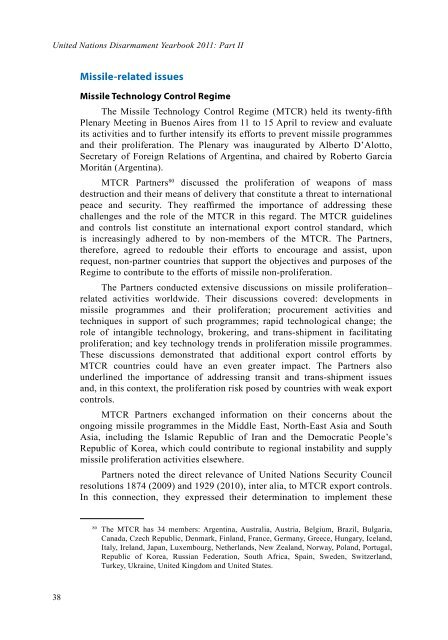DYB2011-Part-II-web
DYB2011-Part-II-web
DYB2011-Part-II-web
You also want an ePaper? Increase the reach of your titles
YUMPU automatically turns print PDFs into web optimized ePapers that Google loves.
United Nations Disarmament Yearbook 2011: <strong>Part</strong> <strong>II</strong><br />
38<br />
Missile-related issues<br />
Missile Technology Control Regime<br />
The Missile Technology Control Regime (MTCR) held its twenty-fifth<br />
Plenary Meeting in Buenos Aires from 11 to 15 April to review and evaluate<br />
its activities and to further intensify its efforts to prevent missile programmes<br />
and their proliferation. The Plenary was inaugurated by Alberto D’Alotto,<br />
Secretary of Foreign Relations of Argentina, and chaired by Roberto Garcia<br />
Moritán (Argentina).<br />
MTCR <strong>Part</strong>ners80 discussed the proliferation of weapons of mass<br />
destruction and their means of delivery that constitute a threat to international<br />
peace and security. They reaffirmed the importance of addressing these<br />
challenges and the role of the MTCR in this regard. The MTCR guidelines<br />
and controls list constitute an international export control standard, which<br />
is increasingly adhered to by non-members of the MTCR. The <strong>Part</strong>ners,<br />
therefore, agreed to redouble their efforts to encourage and assist, upon<br />
request, non-partner countries that support the objectives and purposes of the<br />
Regime to contribute to the efforts of missile non-proliferation.<br />
The <strong>Part</strong>ners conducted extensive discussions on missile proliferation–<br />
related activities worldwide. Their discussions covered: developments in<br />
missile programmes and their proliferation; procurement activities and<br />
techniques in support of such programmes; rapid technological change; the<br />
role of intangible technology, brokering, and trans-shipment in facilitating<br />
proliferation; and key technology trends in proliferation missile programmes.<br />
These discussions demonstrated that additional export control efforts by<br />
MTCR countries could have an even greater impact. The <strong>Part</strong>ners also<br />
underlined the importance of addressing transit and trans-shipment issues<br />
and, in this context, the proliferation risk posed by countries with weak export<br />
controls.<br />
MTCR <strong>Part</strong>ners exchanged information on their concerns about the<br />
ongoing missile programmes in the Middle East, North-East Asia and South<br />
Asia, including the Islamic Republic of Iran and the Democratic People’s<br />
Republic of Korea, which could contribute to regional instability and supply<br />
missile proliferation activities elsewhere.<br />
<strong>Part</strong>ners noted the direct relevance of United Nations Security Council<br />
resolutions 1874 (2009) and 1929 (2010), inter alia, to MTCR export controls.<br />
In this connection, they expressed their determination to implement these<br />
80 The MTCR has 34 members: Argentina, Australia, Austria, Belgium, Brazil, Bulgaria,<br />
Canada, Czech Republic, Denmark, Finland, France, Germany, Greece, Hungary, Iceland,<br />
Italy, Ireland, Japan, Luxembourg, Netherlands, New Zealand, Norway, Poland, Portugal,<br />
Republic of Korea, Russian Federation, South Africa, Spain, Sweden, Switzerland,<br />
Turkey, Ukraine, United Kingdom and United States.


